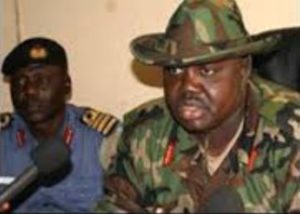News
Tompolo’s Kinsmen Demand Trial Of Former JTF Boss, Sarkin Bello
By Our Correspondent
Tompolo’s Kinsmen, leaders and elders of Gbaramatu kingdom in Warri, Delta State under the auspices of Federated Niger Delta Ijaw Communities (FNDIC) and Gbaramatu Rebirth Initiative, (GIR), have called on the Federal Government to try the former Commander of Joint Task Force, Brig. Gen. Sarkin Yarki Bello, over the 2009 military offensive against the people of Gbaramatu Kingdom.

They said it has become necessary for the federal government to initiate a disciplinary measure against Bello’s action which led to the December 5, 2013 judgment, of which the federal government was ordered to pay the 53 communities N99, 999,999,999.30.
This was contained in a statement issued after a week-long activities to mark the May 15, Gbaramatu Freedom Day, signed by Chief (Dr.) Bello Oboko, (FNDIC President), Mr Fred Pink (FNDIC Research Team Member), Mr. Moses Yabrade (GRI Coordinator), Mr. Godswill Doubra Wuruyai and made available to newsmen in Warri, Delta State.
The leaders in the statement demanded that the excesses of retired JTF Commander during the Gbaramatu bombardment of 2009 which brought about the unforgettable horror on the good Ijaw people of Gbaramatu Kingdom must be redressed through disciplinary measures.
Besides, they expressed concerns that the Federal Government have delayed the payment of N99.9bn judgement Compensation awarded to the communities affected by the Federal High Court, Asaba in 2013, saying that the delay may give rise to fresh agitations in the area.
They also called on the Federal Government to initiate rebuilding and rehabilitation of communities destroyed by the military in the 2009 bombardment of Gbaramatu Kingdom.
The leaders also called on the Independent National Electoral Commission, INEC, to redress arbitrary electoral ward adoptions for elections in Warri South-West Local Government Area of Delta State since 1999, which INEC admitted produced “skewed results to satisfy certain selfish (ethnic) interests”.
They maintained that 40 years of devastating environmental pollution and double standards by the oil companies are the principle causes for the tension in the Niger Delta region.
“We believe that no responsible oil company can operate behind the terror of armed soldiers”.
The leaders therefore reiterated their earlier call on the oil companies as demanded by the Organizations of Conscience around the world, dated January 6, 1999 and as published in the Guardian to cease their activities in the region until all military units are removed, all activists released from prison, and situation is peacefully resolved”.
“We strongly advise the International Oil Companies, IOCs, especially Chevron, Shell and Agip to heed to the wise advice of Citizens and Organizations of Conscience around the world, to consider the removal of military units behind oil operations”.
Read More: Okowa Picks Otuaro as Running Mate, But Serious Challenges Ahead
“Military-aided oil operations have been associated with hostilities in the creeks and should be discouraged in order to guarantee genuine peace, devoid of intimidation which is an element of structural violence against the good Ijaw People of Gbaramatu Kingdom “.
Redefining what freedom means to them, the leaders said that freedom means enjoying the fruit of the Escravos Export Processing Zone, EPZ project with sense of right, not privilege.
“Freedom to us means the right to host Nigerian Maritime University (NMU), Okerenkoko”.
“Freedom to us means the right to host Escravos Modular Refinery, Kunukunuma’.
“Freedom to us means to execute the agreed provision of constant turbine electricity light to all Gbaramatu communities , including Kokodiagbene”.
“Freedom to us means peaceful relations with our ethnic neighbours.
They however called on Governor of Delta State, Senator Dr Ifeanyi Okowa, to consider the “Roadmap to Peace” charted by former governor, Chief James Ibori, and assist the Warri ethnic groups to embrace the peace and rekindle “the balance which the British colonial government and subsequent post-independent governments used to stabilize relationships” among ethnic groups in Warri.


